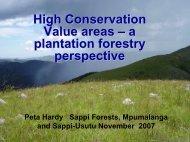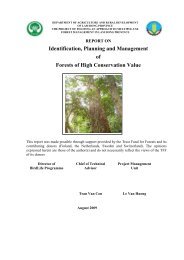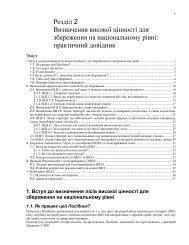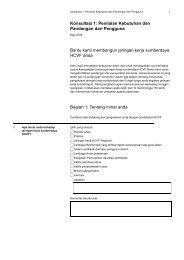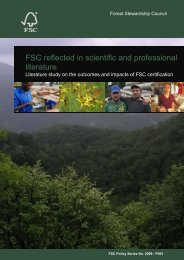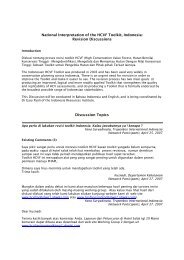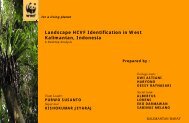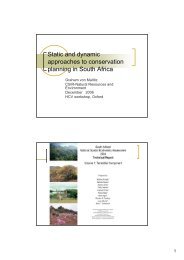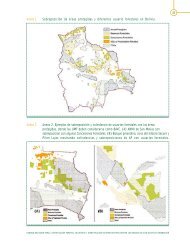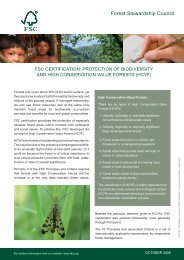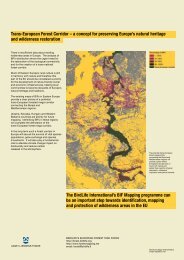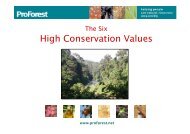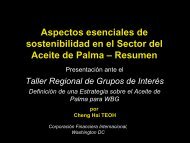Forests Sourcebook - HCV Resource Network
Forests Sourcebook - HCV Resource Network
Forests Sourcebook - HCV Resource Network
Create successful ePaper yourself
Turn your PDF publications into a flip-book with our unique Google optimized e-Paper software.
tant part of the World Bank’s contribution to development is<br />
the analytical and advisory activities 3 carried out for client<br />
countries. These activities provide a foundation for defining<br />
strategic priorities and informing policy dialogue and decisions<br />
on projects and programs and comprise economic and<br />
sector work, nonlending technical assistance, and knowledge<br />
management, as well as training and research services.<br />
The World Bank also has prepared country-level forest<br />
sector reviews in several countries with a focus on FLEG.<br />
Furthermore, as part of its analytical and advisory work and<br />
as an integral part of its strategic approach to forest governance,<br />
the World Bank has actively supported international<br />
and regional initiatives on forest governance (see box 5.2),<br />
including the three regional ministerial FLEG conferences.<br />
At the country level, the World Bank has supported the<br />
development of national-level action plans related to controlling<br />
illegal logging and improving forest sector transparency<br />
for Albania, Armenia, Bosnia and Herzegovina,<br />
Indonesia, and Russia. In some cases, World Bank work<br />
related to investments in other sectors also involves issues of<br />
illegal logging and forest governance.<br />
KEY ISSUES<br />
Finding ways to improve forest governance is a challenging<br />
task. In addition, poor governance in the sector is often symptomatic<br />
of poor governance in the overall economy, compounding<br />
the problem. For example, illegal money generated<br />
from forest crimes often fuels “slush funds” for corruption in<br />
other sectors, including campaign financing, speculation,<br />
gambling, and human and drug trafficking, all of which have<br />
deep negative impacts on the economy at large. This access to<br />
illegal money also creates powerful vested interests, both<br />
within and outside the sector, which tend to benefit from the<br />
status quo and therefore strongly oppose any reforms.<br />
Approaches to addressing forest governance and law<br />
enforcement must deal with, among other things, issues connected<br />
to land tenure arrangements, access rights (see note 1.4,<br />
Box 5.2<br />
Finding Synergies Between the World Bank Group’s Efforts in FLEG and Its Broader Governance<br />
Reforms for Greater Impact<br />
The forestry portfolio is nested within the World<br />
Bank’s overall approach to governance and anticorruption<br />
and is consistent with a wide range of governance<br />
work being led by other sectors in the World Bank.<br />
Some of the more relevant work of other parts of<br />
the World Bank Group on governance includes support<br />
to Poverty Reduction Strategy Paper processes<br />
and the alignment of the World Bank’s CAS with these<br />
processes, work on governance diagnostics and integration<br />
of governance and anticorruption elements in<br />
the CASs, and the design of specific capacity-building<br />
programs based on the diagnostic surveys (Poverty<br />
Reduction and Economic Management <strong>Network</strong> and<br />
the World Bank Institute). Other relevant areas of the<br />
World Bank’s work focus on anti-money laundering<br />
and financial investigation, the Extractive Industries<br />
Transparency Initiative, Justice for the Poor, and customs<br />
modernization. The World Bank’s legal department<br />
has carried out important work in developing a<br />
benchmark study for assessing the quality of legal and<br />
regulatory frameworks. The Department of Institutional<br />
Integrity’s investigative approaches to allegations<br />
of corruption in Bank-funded projects provide<br />
potentially powerful instruments to combat illegal logging<br />
and forest crimes. Similarly, some of the work<br />
with corporate social responsibility and social and<br />
environmental issues in the operations of the International<br />
Finance Corporation (IFC) (for example, investment<br />
safeguard policies) is extremely relevant to FLEG<br />
issues (see note 3.2, Forest Certification Systems).<br />
The forestry work of the World Bank Group needs<br />
to be more consciously informed by and aligned with<br />
these initiatives. The expertise accumulated in these<br />
specialized fields is only now being brought to bear on<br />
the problems of forestry. Where it has been applied, for<br />
example, in anti-money laundering, it is clear that<br />
there is enormous potential to address problems in the<br />
sector. There are also potential advantages for these<br />
specialized initiatives to work with forestry because<br />
this can provide an important sectoral entry point on<br />
which to ground the specialized efforts.<br />
Joint analytic work needs to be strengthened across<br />
the World Bank’s organizational boundaries, specialists<br />
from other areas need to be familiarized with the special<br />
circumstances of forestry, and understanding<br />
among external stakeholders of the relevance of these<br />
tools needs to be improved. Transaction costs involved<br />
in working across sectoral lines can be significant and<br />
internal incentives need to be aligned to encourage<br />
cross-sectoral collaboration.<br />
Source: World Bank 2006.<br />
CHAPTER 5: IMPROVING FOREST GOVERNANCE 155



